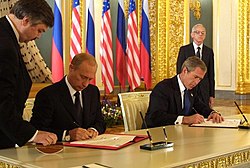| Treaty on Strategic Offensive Reductions | |
|---|---|
 Presidents Vladimir Putin and George W. Bush sign SORT on 24 May 2002 in Moscow | |
| Type | Strategic nuclear disarmament |
| Signed | 24 May 2002 |
| Location | Moscow |
| Effective | 1 June 2003 |
| Condition | Ratification of both parties |
| Expiration | 5 February 2011 (Superseded by New START) |
| Signatories | |
| Parties | |
| Ratifiers | U.S. Senate State Duma |
| Languages | English, Russian |
The Treaty Between the United States of America and the Russian Federation on Strategic Offensive Reductions (SORT), also known as the Treaty of Moscow, was a strategic arms reduction treaty between the United States and Russia that was in force from June 2003 until February 2011 when it was superseded by the New START treaty.[1]
At the time, SORT was positioned as "represent[ing] an important element of the new strategic relationship" between the two countries[2] with both parties agreeing to limit their nuclear arsenal to between 1,700 and 2,200 operationally deployed warheads each. It was signed in Moscow on 24 May 2002.
After ratification by the U.S. Senate and the State Duma, SORT came into force on 1 June 2003. It would have expired on 31 December 2012 if not superseded by New START. Either party could have withdrawn from the treaty upon giving three months written notice to the other.
- ^ Obama, Barack (13 May 2010). "Memo to the Senate of the United States" (PDF). White House Office of the Press Secretary. Archived from the original (PDF) on 28 May 2010.
- ^ Letter of Transmittal: The Moscow Treaty 2002